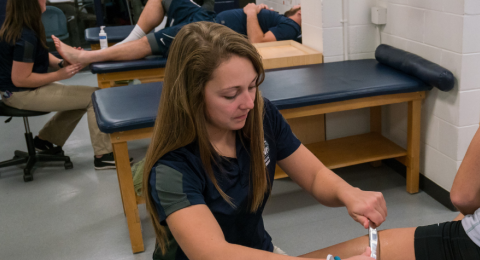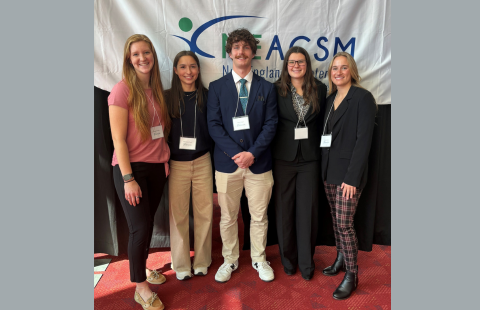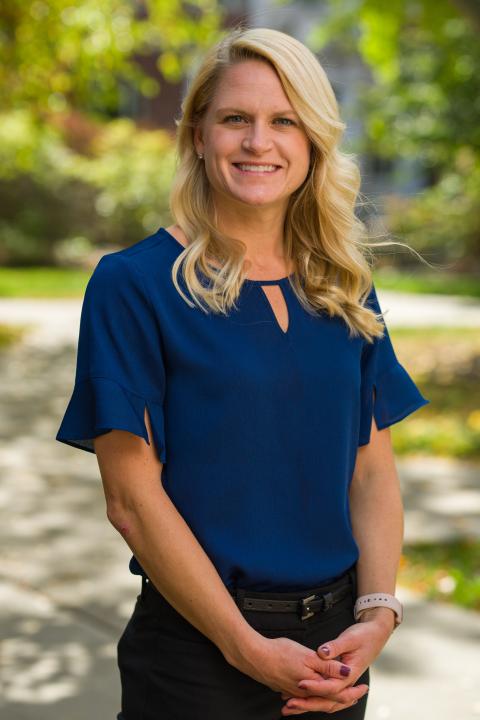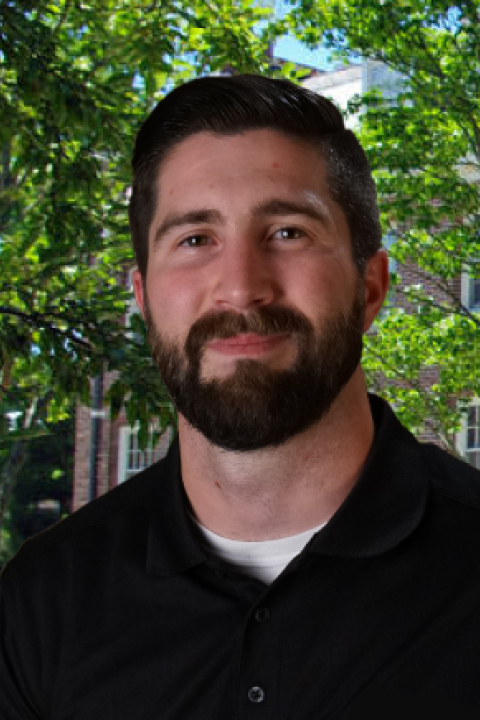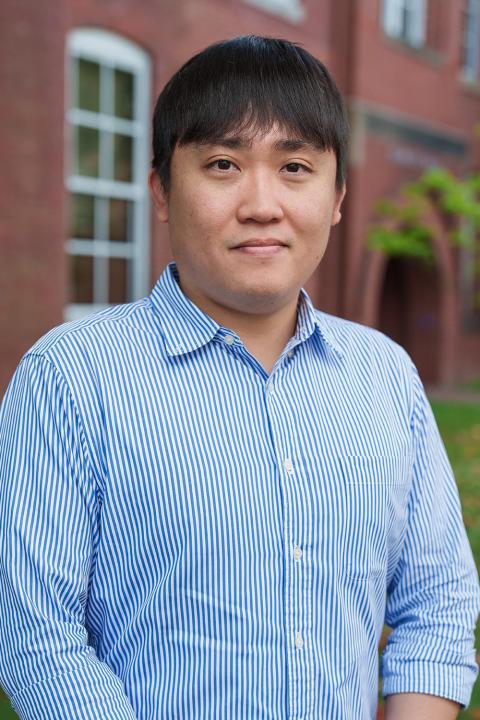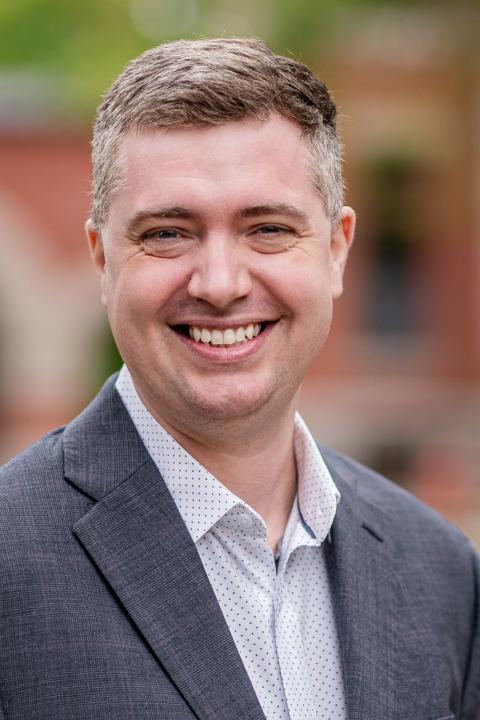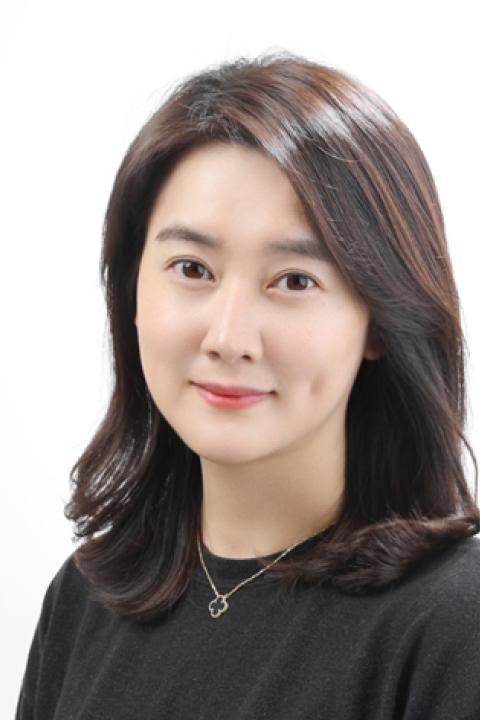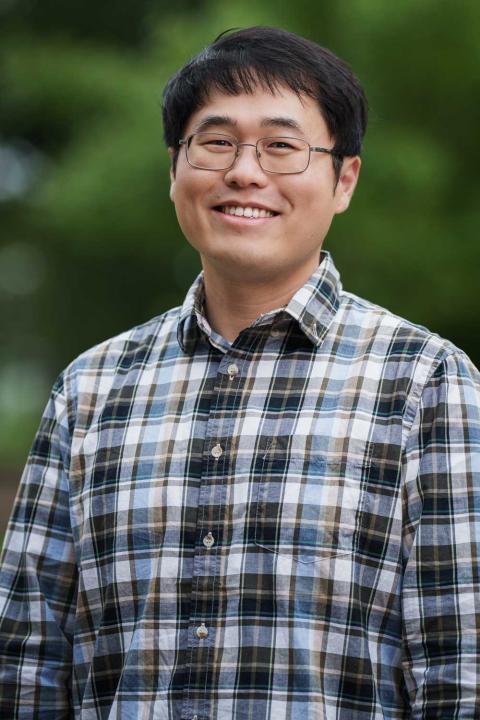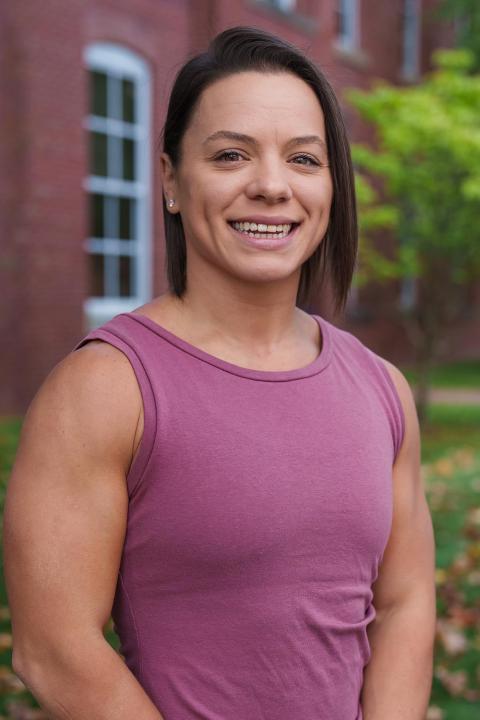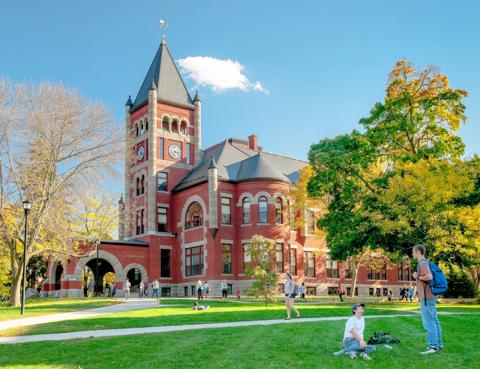The Health Sciences major at UNH provides a strong foundation for a career in healthcare. You’ll study a combination of core life sciences and evidence-based healthcare principles. Through tailored studies and experiential activities, you will be well-prepared to pursue an advanced clinical degree or to begin work that enhances individual and community well-being.
WHAT IS HEALTH SCIENCES?
health sciences program is for students concerned with the well-being of others and interested in a career in healthcare. Health sciences majors should possess a strong science aptitude and a passion for health and wellness. As healthcare has evolved in the U.S., degree programs in the allied health professions (athletic training, physical therapy, physician assistant, etc.) have moved to post-baccalaureate education. Individuals with career interests in allied health professions must first attain prerequisite knowledge to be prepared to study in these advanced degree programs. This rigorous academic program prepares students for graduate study in a variety of allied health disciplines including, but not limited to,physician assistant studies, physical therapy, chiropractic, athletic training and more.
WHY STUDY HEALTH SCIENCES AT UNH?
As a health sciences major at UNH, this program of study will prepare you for a range of careers in the large and interdisciplinary healthcare field. This versatile major provides the foundational, prerequisite knowledge for graduate education in health professions, and is general enough to give you flexibility to structure your program of study to your professional career interests. A health sciences student will have an academic advisor who understands the requirements and nuances of applying to advanced degree programs. Students will receive instruction in the life sciences, pharmacology, nutrition, culturally responsive healthcare, injury and disease prevention, diagnosis and treatment, kinesiology and health behaviors.
POTENTIAL CAREERS
- Physician assistant
- Physical therapy
- Athletic training
- Chiropractic
- Medicine
- Nursing
- Occupational therapy
From the CHHS Blog
Curriculum & Requirements
The Health Sciences program is for those students who are concerned with the health and well-being of others, possess a strong science aptitude, and plan to pursue a career in healthcare. As healthcare has evolved in the U.S., degree programs in the allied health professions (physical therapy, physician assistant, etc.) have moved to post-baccalaureate education. Individuals with career interests in allied health professions must first attain prerequisite knowledge to be prepared to study in these advanced degree programs. This rigorous academic program provides the foundational life science coursework and advanced elective course offerings to prepare students for graduate programs in the allied health sciences.
Admission to graduate study in medical or allied health professions is very competitive and requires applicants to demonstrate exemplary academic performance for admission.
Sample Degree Plan
This sample degree plan serves as a general guide; students collaborate with their academic advisor to develop a personalized degree plan to meet their academic goals and program requirements.
| First Year | ||
|---|---|---|
| Fall | Credits | |
| BIOL 411 | Introductory Biology: Molecular and Cellular | 4 |
| HMP 401 | United States Health Care Systems | 4 |
| ENGL 401 | First-Year Writing | 4 |
| Discovery/Elective | 4 | |
| Credits | 16 | |
| Spring | ||
| BIOL 412 | Introductory Biology: Evolution, Biodiversity and Ecology | 4 |
| HS 501 | Medical Terminology | 2 |
| PSYC 401 | Introduction to Psychology | 4 |
| Discovery/Elective | 4 | |
| Discovery/Elective | 4 | |
| Credits | 18 | |
| Second Year | ||
| Fall | ||
| HS 605 | Exploration of Allied Health Professions (fall or spring) | 2 |
| KIN 585 & 585L | Emergency Medical Responder and Emergency Medical Responder Lab | 5 |
| BMS 507 | Human Anatomy and Physiology I | 4 |
| Discovery/Elective | 4 | |
| Credits | 15 | |
| Spring | ||
| NUTR 400 | Nutrition in Health and Well Being | 4 |
| BMS 508 | Human Anatomy and Physiology II | 4 |
| PSYC 402 | Statistics in Psychology 1 | 4 |
| Discovery Elective | 4 | |
| Credits | 16 | |
| Third Year | ||
| Fall | ||
| CHEM 403 | General Chemistry I | 4 |
| HS 770 | General Medical Conditions for Health Professions | 4 |
| HS 656 | Musculoskeletal Pathologies for Health Professions | 4 |
| HS 657 | Musculoskeletal Pathologies for Health Professions Lab | 1 |
| Discovery Elective (see recommended electives under requirements) | 4 | |
| Credits | 17 | |
| Spring | ||
| CHEM 404 | General Chemistry II | 4 |
| HS 767 | Pharmacology for Health Professions | 4 |
| HMP 744 | Law and Ethics in Healthcare | 4 |
| HS 702 | From Lab to Life: Interpretation of Research to Guide Clinical Practice | 4 |
| Credits | 16 | |
| Fourth Year | ||
| Fall | ||
| HS 741 | The Art and Science of Healthcare Practice: Integrating Clinical Knowledge with Professional Skills | 4 |
| PHYS 401 | Introduction to Physics I | 4 |
| Discovery Elective (see recommended electives under requirements) | 4 | |
| Discovery Elective (see recommended electives under requirements) | 4 | |
| Credits | 16 | |
| Spring | ||
| HS 717 | Cultural Considerations in Health Care | 4 |
| Discovery Elective (see recommended electives under requirements) | 4 | |
| Discovery Elective (see recommended electives under requirements) | 4 | |
| Discovery Elective (see recommended electives under requirements) | 4 | |
| Credits | 16 | |
| Total Credits | 130 | |
Degree Requirements
All Major, Option and Elective Requirements as indicated.
*Major GPA requirements as indicated.
Major Requirements
Students are required to have earned a minimum, cumulative, GPA of 2.85 by the end of their Sophomore/2nd Year in the Health Sciences Major. Students are also required to achieve a C or better in all required courses in the major. Students with a GPA below 2.85 will be excluded (removed) from the Health Sciences Major.
| Code | Title | Credits |
|---|---|---|
| Required Courses | ||
| BIOL 411 | Introductory Biology: Molecular and Cellular | 4 |
| BIOL 412 | Introductory Biology: Evolution, Biodiversity and Ecology | 4 |
| BMS 507 | Human Anatomy and Physiology I | 4 |
| BMS 508 | Human Anatomy and Physiology II | 4 |
| CHEM 403 | General Chemistry I | 4 |
| CHEM 404 | General Chemistry II | 4 |
| HS 501 | Medical Terminology | 2 |
| HS 605 | Exploration of Allied Health Professions | 2 |
| HS 656 | Musculoskeletal Pathologies for Health Professions | 4 |
| HS 657 | Musculoskeletal Pathologies for Health Professions Lab | 1 |
| HS 702 | From Lab to Life: Interpretation of Research to Guide Clinical Practice | 4 |
| HS 717 | Cultural Considerations in Health Care | 4 |
| HS 741 | The Art and Science of Healthcare Practice: Integrating Clinical Knowledge with Professional Skills | 4 |
| HS 767 | Pharmacology for Health Professions | 4 |
| HS 770 | General Medical Conditions for Health Professions | 4 |
| KIN 585 & 585L | Emergency Medical Responder and Emergency Medical Responder Lab | 5 |
| NUTR 400 | Nutrition in Health and Well Being | 4 |
| PHYS 401 | Introduction to Physics I | 4 |
| PSYC 401 | Introduction to Psychology | 4 |
| HMP 401 | United States Health Care Systems | 4 |
| HMP 744 | Law and Ethics in Healthcare | 4 |
| PSYC 402 | Statistics in Psychology 1 | 4 |
| or SOC 402 | Statistics | |
| or HMP 540 | Statistics for Health and Human Service Professionals | |
- 1
Any UNH statistics course satisfies the requirement with advisor approval.
Required University Courses
Candidates for a degree must satisfy all of the University Discovery requirements in addition to satisfying the requirements of the Health Sciences curriculum and any pre-requisite coursework needed to apply to the graduate programs they plan to pursue.
Recommended Electives
A student’s plan of elective courses should align with post-baccalaureate pursuits, and be approved by a Health Sciences advisor.
Recommended electives for future health professionals that are external to the Health Sciences courses may include course work in Communication Sciences & Disorders, Human Development & Family Studies, Health & Human Services, Health Management & Policy, Kinesiology, Nursing, Occupational Therapy, Recreation Management & Policy, Social Work, and other coursework in the life sciences and health and human services.
| Code | Title | Credits |
|---|---|---|
| BMCB 658 & BMCB 659W | General Biochemistry and General Biochemistry Lab | 5 |
| BMS 503 & BMS 504 | General Microbiology and General Microbiology Laboratory | 5 |
| CHEM 545 & CHEM 546 | Organic Chemistry and Organic Chemistry Laboratory | 5 |
| EXSC 620 | Physiology of Exercise | 4 |
| GEN 604 | Principles of Genetics | 4 |
| KIN 652 | Clinical Kinesiology | 4 |
| KIN 684 & KIN 685 | Emergency Medical Care: Emergency Medical Technician (EMT) and Emergency Medical Care: EMT Lab | 6 |
| KIN 706 | Neurology | 4 |
| PHYS 402 | Introduction to Physics II | 0 |
| PSYC 561 | Psychopathology | 4 |
| PSYC 581 | Child Development | 4 |
Program Learning Outcomes
- Demonstrate understanding of core principles of biology, chemistry, physics, anatomy and physiology, psychology, and kinesiology.
- Demonstrate comprehension of musculoskeletal evaluation and assessment techniques.
- Demonstrate responsiveness to cultural considerations in healthcare. a.) Understand influence of age, race, ethnicity, gender, sexual orientation, spirituality, socioeconomic status, and other aspects of diversity on individual healthcare needs and health-related quality of life.
- Demonstrate an understanding of scientific research and writing. a.) Ability to identify and analyze scholarly literature. b.) Ability to synthesize and articulate research findings through writing.
- Demonstrate knowledge of behaviors, scopes of practice, and legal and ethical standards for health professions.
- Understand concepts of evidence-based practice and patient-centered care for health professions.
Explore Program Details
Q: I’m currently an undergraduate student at UNH. I’m interested in changing my major to Health Sciences (BS), how do I do that?
- Students seeking to change their major to Health Sciences must complete an internal transfer application and complete all necessary steps as outlined in the instructions.
- Health Sciences is a competitive major. Students seeking to transfer to the Health Sciences major must complete and submit an application. Applications will be accepted during the spring semester; the deadline is April 15th. Applicants are required to have successfully completed BMS 507 with at least a C or better and either completed or be currently enrolled in BMS 508, attained a minimum cumulative GPA of 3.0, and submit a letter of intent that explains your interest in the Health Sciences major. Students granted acceptance will be informed after the completion of the spring semester in which they applied and will begin in the major during the subsequent fall semester. These requirements reflect the minimum standards for eligible applicants; competitive applicants will exceed these benchmarks by showing proof of academic excellence.
Q: I’m currently a high school student and I want to become a physician assistant, physical therapist, or another health profession with a degree program at the post-graduate level (MS or higher). How can I achieve this goal by attending UNH?
- The Health Sciences major will provide you with the coursework that are common pre-requisites for post-graduate study in physician assistant studies, physical therapy, athletic training, medicine, nursing, and many other health-related professional programs of study. UNH does not currently offer post-professional degree programs in all of the allied health disciplines listed above; it is the student’s responsibility to identify, make themselves eligible for, and ultimately apply to their desired post-graduate programs.
- The Health Sciences major includes full years (2 semesters) in biology, chemistry, human anatomy and physiology, and physics.
- The Health Sciences major also includes introductory coursework in epidemiology, general medical conditions, pharmacology, exercise physiology, orthopedic injury assessment, diagnosis, and treatment.
- The Health Sciences major includes over 20 credits of elective/open coursework that students can use to design a curriculum that meets the specific pre-requisite requirements of their chosen field of professional education. The successful completion of pre-requisite coursework is the responsibility of the student. Students interested in specific allied health professional degree programs should research the eligibility requirements for those programs to which they intend to apply to ensure they meet all requirements for successful application and entry to those programs.
- The Health Sciences major includes coursework that requires students to find observation experiences with practicing professionals in several allied health fields to assist students in making the appropriate career choice based on their interests.
- The Health Sciences major is not a clinical education major, and there are no guaranteed clinical experiences or exposures for students in the major. Students seeking entry to professional post-graduate degree programs will learn discipline-specific clinical skills in those post-graduate programs. It is the student’s responsibility to take all pre-requisite coursework for the post-graduate programs in which they intend to pursue.
Health Sciences is a competitive major. Students seeking to transfer to the Health Sciences major must complete and submit an application. Applications will be accepted during the spring semester; the deadline is April 15th. Applicants are required to have successfully completed BMS 507 with at least a C or better and either completed or be currently enrolled in BMS 508, attained a minimum cumulative GPA of 3.0, and submit a letter of intent that explains your interest in the Health Sciences major. Students granted acceptance will be informed after the completion of the spring semester in which they applied and will begin in the major during the subsequent fall semester. These requirements reflect the minimum standards for eligible applicants; competitive applicants will exceed these benchmarks by showing proof of academic excellence.
Students interested in our Health Sciences major may also be interested in these advanced degree offerings:
